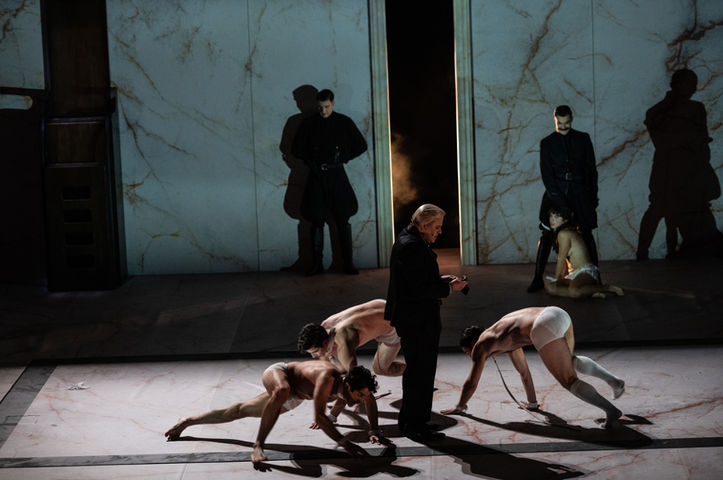Aris Biniaris
Director
SALÓ, OR THE 120 DAYS OF SODOM
Based on Pier Paolo Pasolini’s film of the same title
Still banned in several countries all over the world, the film that shocked audiences and critics alike upon its release (shortly after its creator’s murder) is based on Marquis de Sade’s unfinished novel Les 120 Journées de Sodome (The 120 Days of Sodom). The film’s story is set in the Republic of Salò, a puppet-state of Nazi Germany situated in Italy, where, among other things, the fascists undertake the education of nine girls and nine boys and –after having them taken away with the consent of their families– turn them into slaves and subject them to extreme physical and mental torture.
This absolutely liminal psychosexual investigation of the aesthetics and philosophy of totalitarianism by Pasolini and his co-screenwriter, Sergio Citti, is turned, on the GNO Alternative Stage, into a theatre production by director Aris Biniaris in collaboration with composer Jeph Vanger and an extensive cast of distinguished actors.
Pier Paolo Pasolini’s film Salò, or the 120 Days of Sodom, caused a stir among audiences and critics alike due to its depiction of a bleak and violent universe during a time when society was fervently longing to get over and forget the dark days of fascist and Nazi occupation. 30 years after the end of World War II, the versatile filmmaker attempted to recompose Europe’s fragmented memory, not via an attempt at a historical representation but, instead, through the creation of an unmatched poetic allegory that reveals the frightening resilience of totalitarianism and its potential transformation into late capitalism. As Pasolini himself stated in one of his interviews: “I think that consumerism manipulates and rapes bodies neither more nor less than Nazism. My film represents this ominous coincidence between consumerism and Nazism.”
Part of a projected cinematic trilogy (Trilogy of Death) that was never finished, Salò, or the 120 Days of Sodom, is Pier Paolo Pasolini’s final comment on the rise of neofascism and the nightmarish onslaught of capitalism. Almost 50 years after its release, the film remains a “genuinely Sadean object” –as French thinker Roland Barthes wrote– which embarrasses everyone.
In this theatrical interpretation of the story, in a secluded and well-protected space, three men, The Duke, His Excellency and His Highness, have gathered a group of young boys and girls whom they subject to extreme physical and mental torture. Here, the “trilogy of death” unfolds in three circles (the Circle of Manias, the Circle of Shit and the Circle of Blood), while, concurrently, two female Storytellers recount risqué erotic stories drawn from Marquis de Sade's unfinished novel The 120 Days of Sodom.
In a nightmarish environment of unbridled violence, the insidious tactics of fascism take the form of extreme sadomasochistic practices aimed at the gradual enslavement and extermination of the would-be victims. The hosts of this gruesome ritual of annihilation, agents of an authoritarian power that revels in humiliation, rape and murder, use their position of power to prove that they are the ones who determine the horrific rules of their gruesome game.
The youths’ ravaged bodies strongly hint at the existence of a violent and uncontrollably unjust world that constantly provides fertile ground for the growth of totalitarianism. The methods of detention, coercion and mental as well as physical misery serve as an allegory for the entire philosophy of fascism, which is put into practice wherever and whenever conditions allow.
In his first collaboration with the GNO Alternative Stage, Aris Biniaris directs an atmospheric and evocative production, full of suppressed tension that approaches its climax gradually. The Greek translation, dramaturgy, and theatre adaptation were done by Aris Biniaris and Elena Triantafyllopoulou.
Processed synthesizers, organ sounds, cello and viola timbres, human voices and electronic rhythms make up the productions’ sonic universe created by the up-and-coming composer Jeph Vanger. “The creation of this sonic universe is an effort to reflect the work’s complexity and tension, which resulted from the daily friction during the rehearsals and the bundle of emotions, actions and words, with which I was faced while preparing the work in close collaboration with Aris Biniaris and his associates. This process was an adventurous exploration of the combination of sounds and rhythms reflecting the intermediate mental space between hope and fear of the unknown. Choosing each element, I focused on creating an atmosphere that echoes the work’s dark and provocative nature, interspersed with intense bursts of rhythm and fragments of hopeful musical motifs”, notes Jeph Vanger.
Mikaela Liakata’s stage set is “a place for exercising the most absolute and authoritarian form of power, whereas, for those subjected to it, it becomes a place of horrific mental and physical torture. The sparse furniture within the space is inspired by Orthodox and Gothic church furniture architectural design as well as that of famous European mansions, such as the courtrooms of the Palazzo Ducale, and wooden bookcases from the Victorian era”, as she notes.
The costumes were designed by Ilenia Douladiri and the lighting by Vangelis Mountrichas, Alexandros Vardaxoglou is the choreographer and Charis Kremmydas is the sound designer.
Featuring the actors: Kostas Berikopoulos, Ioanna Mavrea, Agoritsa Economou, Giannis Kotsifas, Ieronymos Kaletsanos, Evita Agaitsi, Lena Bozaki, Evi Economou, Giannis Harkoftakis, Nadia Katsoura, Marios Kritikopoulos, Kostas Phoenix, Eirini Tsellou, George Ziakas.






